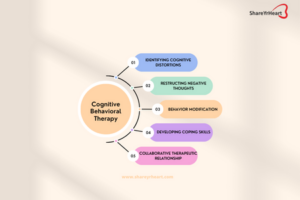Featured Blog on Psychology | ShareYrHeart
Cognitive Behavioral Therapy (CBT) A Comprehensive Guide
Published
11 months agoon
By
Mayukh M DasIn the realm of mental health, Cognitive Behavioral Therapy (CBT) has emerged as a powerful and effective approach to understanding and treating various psychological issues. With its focus on the connection between thoughts, feelings, and behaviors, CBT offers individuals the opportunity to gain insight into their patterns of thinking and make positive changes that lead to improved mental well-being. In this blog, we will delve into the fundamentals of CBT, explore its benefits, and highlight how it can empower individuals to transform their lives.

1. Understanding the Basics of Cognitive Behavioral Therapy:
Cognitive Behavioral Therapy is a goal-oriented, evidence-based approach that addresses the interplay between our thoughts, emotions, and behaviors. It recognizes that our perceptions and interpretations of events shape our emotional responses and subsequent actions. By identifying and challenging negative or distorted thoughts, CBT helps individuals reframe their thinking patterns, leading to healthier emotions and behaviors.
2. Identifying Cognitive Behavioral Therapy Distortions:
Cognitive Behavioral Therapy involves recognizing and addressing cognitive distortions—irrational or inaccurate thought patterns that contribute to negative emotions and behaviors. Common cognitive distortions include all-or-nothing thinking, overgeneralization, mental filtering, and catastrophizing. By becoming aware of these distortions, individuals can learn to challenge and replace them with more realistic and balanced thoughts.
3. Restructuring Negative Thoughts:
Once cognitive distortions are identified, CBT focuses on restructuring negative thoughts through a process called cognitive restructuring. This technique involves examining the evidence for and against negative thoughts, finding alternative explanations, and developing more adaptive and constructive ways of thinking. By actively replacing negative thoughts with positive and realistic ones, individuals can significantly improve their emotional well-being.
4. Behavior Modification:
CBT not only addresses thoughts and beliefs but also emphasizes behavior modification. By identifying and altering maladaptive behaviors that contribute to psychological distress, individuals can break negative cycles and develop healthier patterns of functioning. Through techniques such as exposure therapy, behavioral experiments, and problem-solving strategies, CBT equips individuals with practical tools to overcome challenges and achieve positive behavioral changes.
5. Developing Coping Skills:
Another crucial aspect of CBT is the development of effective coping skills. Individuals learn adaptive strategies to manage stress, regulate emotions, and handle challenging situations. By acquiring and practicing these coping skills, individuals become more resilient and better equipped to navigate life’s difficulties, reducing the risk of relapse and promoting long-term well-being.
6. Collaborative Therapeutic Relationship:
CBT is typically conducted in a collaborative therapeutic relationship between the individual and the therapist. The therapist acts as a guide and facilitator, providing support, empathy, and guidance throughout the therapy process. This collaborative approach fosters a safe and trusting environment, enabling individuals to explore their thoughts and emotions without judgment.
Conclusion
Cognitive Behavioral Therapy is a transformative approach that empowers individuals to take an active role in their mental well-being. By addressing negative thought patterns, restructuring cognitive distortions, modifying behaviors, and developing coping skills, CBT offers a path to lasting change. Whether you’re struggling with anxiety, depression, or other mental health concerns, CBT can provide the tools and insights needed to overcome challenges and lead a more fulfilling life. Embrace the power of CBT and unlock the potential for positive transformation in your journey towards mental well-being.



